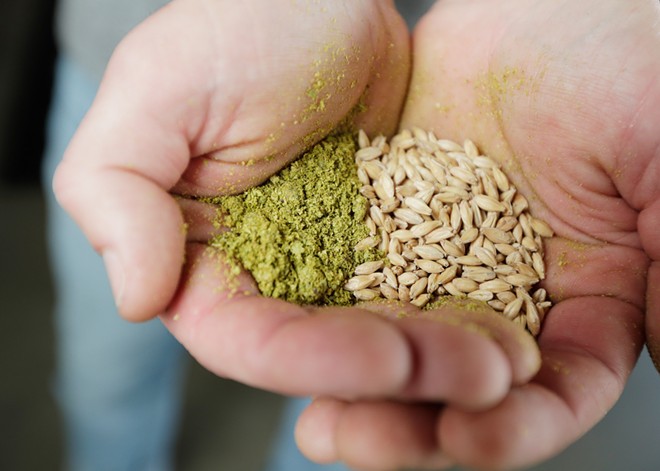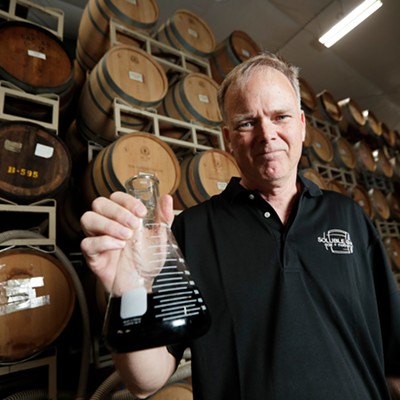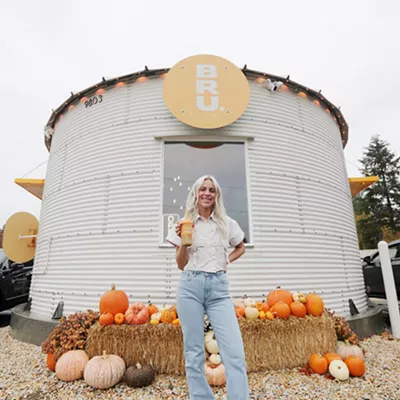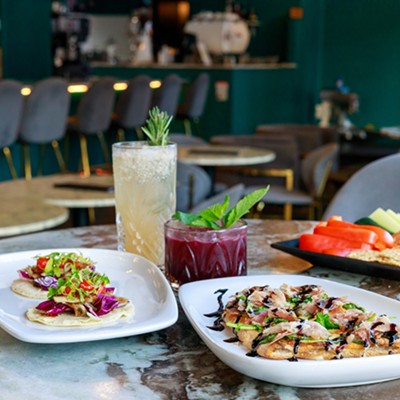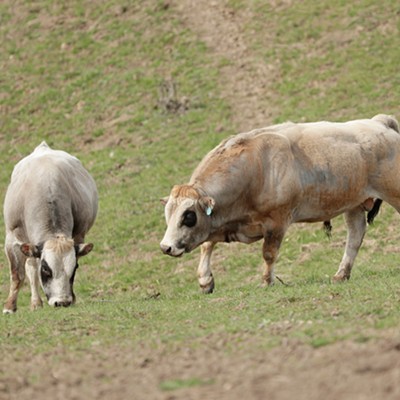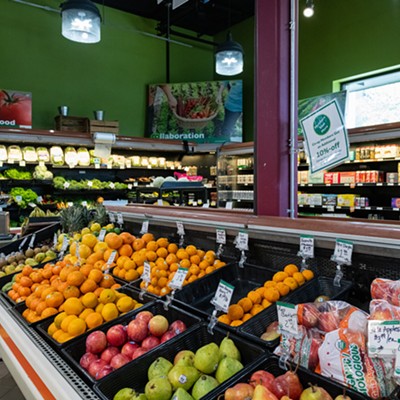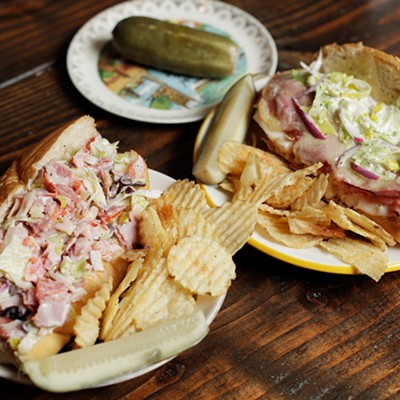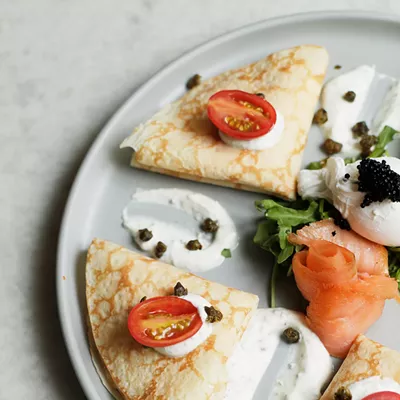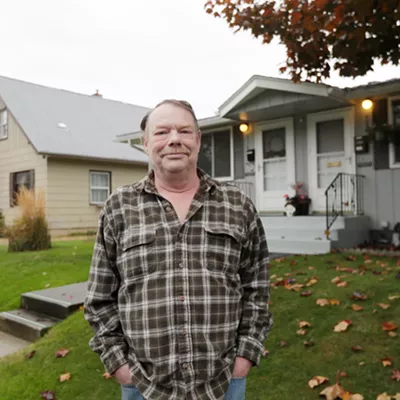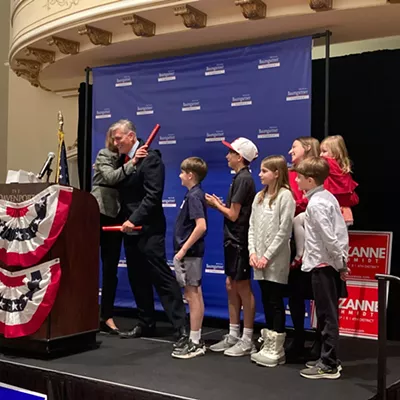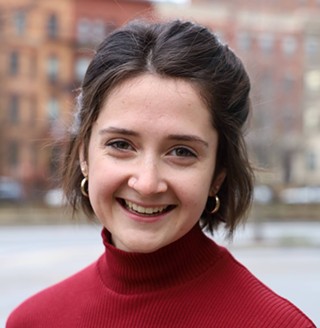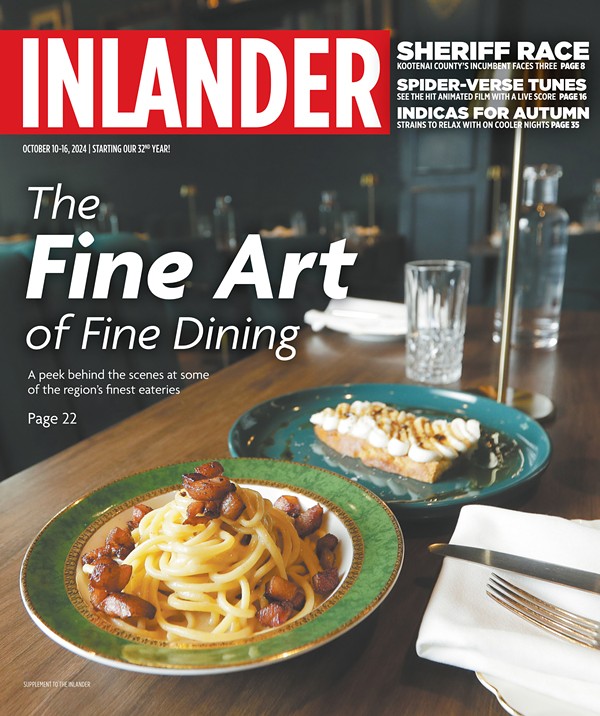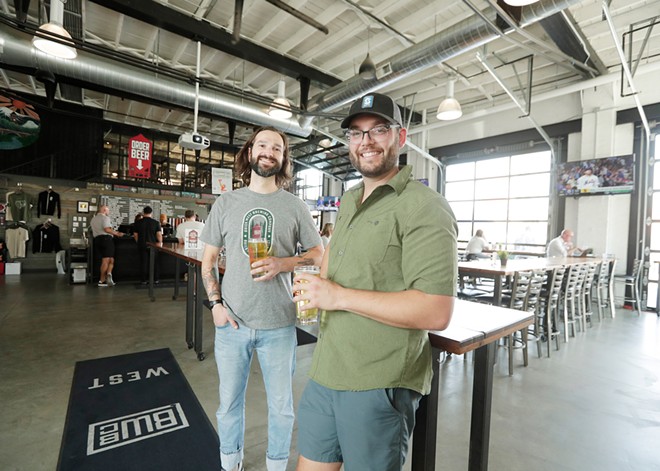
Ever wish you could knock a cold one back with Ribby?
Beer drinkers at Brick West Brewing Co. did when everyone's favorite Redband trout paid the brewery a visit last Thursday evening. The anthropomorphic fish high-fived his way through the taproom and then toured the patio, which was tabled by some of his favorite friends, organizations like the Lands Council, Water Wise Spokane, the Spokane Conservation District and even the Spokane Audubon Society.
They were all there to celebrate Brick West's release of Upstream Pale Lager, a limited edition beer brewed with hops and grains certified by the Portland-based nonprofit Salmon Safe.
Salmon Safe works with farmers, landowners and third-party researchers across the Northwest to encourage and improve watershed-friendly land use. The Salmon Safe certification means that a grower is using pest management and soil conservation techniques that reduce harm to local waterways, plus is looking to build wetland habitats or encourage biodiversity on farmed and non-farmed land.
Upstream is Brick West's third Salmon Safe certified beer, thanks to a partnership between Bill Powers, Brick West's marketing manager, and Brian Muegge, a Gonzaga grad and Salmon Safe farm program manager, with more than a little help from Brick West's Head Brewer, Scotland Shouse.
Powers and Muegge met years ago while working for No-Li Brewhouse. Now, their annual release of a certified Salmon Safe beer at Brick West gives both the brewery and local conservation organizations a chance to educate the public about how a pilsner, lager or IPA affects watershed health.
"Beer is an agricultural product," Muegge says. "The two main components of beer are hops and grain, largely barley. Here in our region of the Pacific Northwest, both of those crops are grown in a high number of acres."
By far the nation's largest hop producer, Washington state harvested nearly 39,000 acres of hops last year and is forecast to harvest about 33,000 acres this year, according to the USDA. The other main hop growing regions are Oregon's Willamette Valley and Idaho's Treasure Valley.
"Close to 90% of the hops that are grown domestically come from those three regions," he says. "They're actually all in the same watershed. They're all part of the Columbia Basin. That's how we operate as an organization — watershed wide."
Muegge says about a third of hops acres in Yakima Valley are currently certified Salmon Safe, as are about 85% of them in the Willamette Valley and about 10% in Idaho. The organization is also working with about two dozen grain growers in the Palouse and a handful of other farmers closer to the Tri-Cities area.
Salmon Safe rides the coattails (caudal fins) of the Northwest's most charismatic fish. Like the panda on the World Wildlife Fund logo, the salmon is a symbol the nonprofit uses to indicate waterway health in general.
"In our region, we should have salmon and steelhead all the way from Astoria to the falls here in town," Muegge says. "We use Salmon Safe as a blanket term. If you're a farmer, what can you do on your land to promote watershed health and functionality?"
But in Idaho, the organization gives "Trout Safe" certifications instead, much to Ribby's delight.
If you were lucky enough to pound an Upstream Pale Lager with the Spokane Indians' finned mascot, you had a highly drinkable beer in hand. The new release, at just 4.4% ABV, is crisp and clean with very little bitterness and no harsh aftertaste. It's got the same virtues as a good conservationist: pure, winsome and plenty of "leave no trace" vibes.
In order for a beer to carry the Salmon Safe logo or the tagline "Drink Like a Fish," it has to contain at least 95% of Salmon Safe certified hops, barley or both (different colored logos refer to different ingredients). Upstream has both — its Salmon Safe certified hops grown by Goschie Farms in Silverton, Oregon, while the certified barley was grown by two growers with Cold Stream Malt & Grain in Latah, Washington.
Salmon Safe grew out of the fish advocacy nonprofit Pacific Rivers in the mid-'90s, after the National Organic Program was established in 1990 and federal organic certification began to gain ground.
"We saw that the organic movement was a good thing, but it wasn't really looking at landscape-level impacts," Muegge says. "Organic farms are reducing synthetic fertilizers and synthetic pesticides, but they aren't really addressing other key components of watershed health like riparian health or other habitat improvements, or robust water tracking to conserve water."
Both conventional and organic growing methods can put waterways at risk. Salmon Safe works collaboratively with any grower to determine what improvements are important and possible on their land, instead of imposing top-down rules.
"You can be an organic farm, but you can use a bunch of copper. Copper, a heavy metal, elevated in a watershed is bad for fish and aquatic life," Muegge says. "We work with organic growers largely to promote habitats and reduce their copper usage. For the nonorganic growers, it's a matter of phasing out a lot more of the chemicals they may have relied upon that are highly deleterious for watershed health."
In addition to working with farmers, Salmon Safe also works with public landowners like city parks and other urban greenspaces to enhance watershed-friendly land use in any setting.
The Upstream Pale Lager will be available on tap for $6.50 a pint at Brick West for the next few weeks. But keep an eye out for the logo around town, because now that Muegge is based in Spokane, you may see it popping up on different brews in the region.
"LINC Malt here in town is a part of LINC Foods, and they work with grain growers locally to malt grain and sell it in town," Muegge says. "A lot of those sources are growers in our program, not just Cold Stream."
Salmon Safe's table on the Brick West patio also introduced beer drinkers to Hard Row to Hoe Vineyards, Lake Chelan's first certified Salmon Safe winery.
It's hard to know what exactly Ribby was thinking, since he can only express himself with fins — but I'd venture to say the Redband would be game to raise a red blend with friends in honor of watershed health, too.

